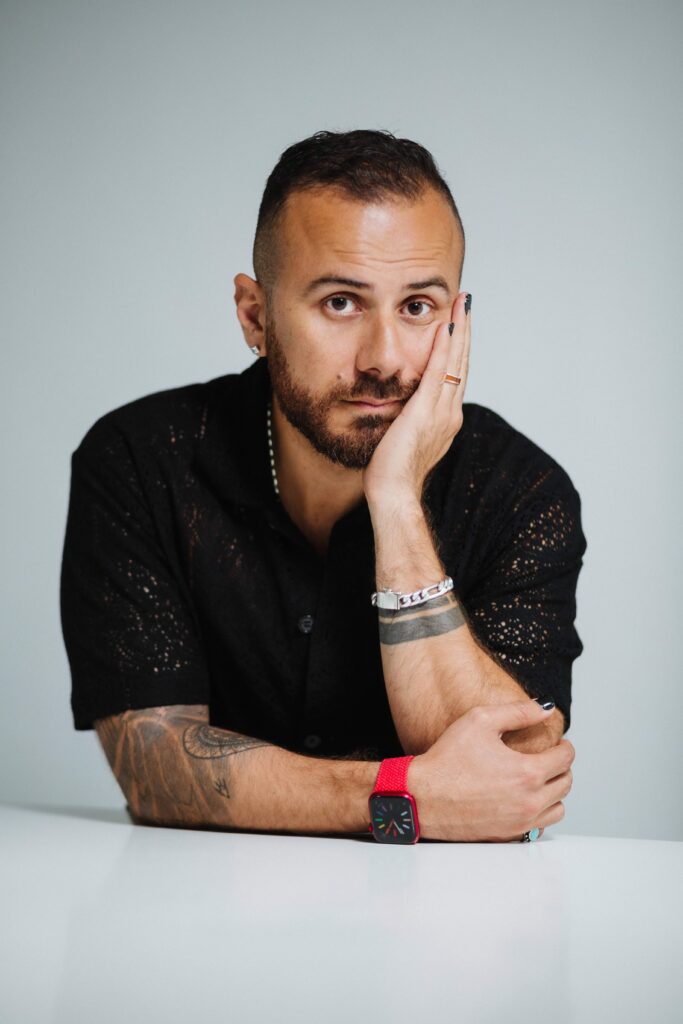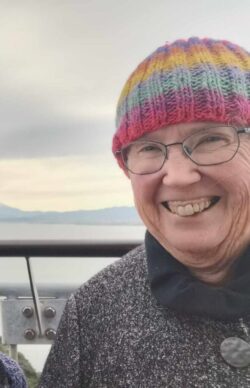The review he doesn’t need
Crooked Teeth: A Queer Syrian Refugee Memoir
by Danny Ramadan
Toronto: Penguin Canada [Viking], 2024
$26.95 / 9780735242210
Reviewed by Wendy Burton
*

We do not owe the world our stories.
This is what came into my mind when I read the opening sentence of Danny Ramadan’s memoir: “Writing this memoir is a betrayal.”
In spite of the many dictates on the contemporary memoir, there are no rules. The best memoirs are those that are true to the author: authentic, real.
The opening pages are a cautionary preface for the reader, containing a lesson in how the reader ought not to respond. Reading as a fifth (or second) generation white daughter of settlers, I am schooled. Ramadan does not want my tears. He does not want my sympathy. He does not want my response to overwhelm his place in the memoir, his place in his home in British Columbia, his place in his own life. He does not want a voyeur.
Ramadan wants trust. He offers his memoir of – as the subtitle tells the reader – a queer Syrian refugee as an act of trust. He wants the reader to appreciate the art, listen, and understand. He also tells me he is motivated to check the reader’s tendency to look for the truth of his own life in the fictional lives of his characters and at the same time offers clues as large as the font on the title page. Ramadan is compelled to tell his story because it is his story and he wants to secure space – hold space – for those inside the story to speak against the versions spoken by those outside the story. There is no white saviour here. Quite the opposite, at times.
Ramadan offers anecdotes of his experiences in literary panels and festivals as a relatively unknown fiction writer being asked those essentialising questions so commonly pitched at othered authors and also listening to non-Syrian writers essentialise his homeland, his life as a gay man, and his experiences as a refugee.
Ramadan warns the reader not to look for gratitude or for the whole story. He warns the reader of ellipses and defies the reader to ask for more than he is willing to tell.

“Okay, reader – I need to let you in on a little secret. I want to tell my story with authority, but I think we can all admit that memories warp and stretch. Holes are left, needing to be filled. I could have written everything exactly as I remember it, but that version would be riddled with qualified statements and uncertainties. … You see, the fiction writer in me couldn’t handle leaving you with ambiguity. I would rather keep you captivated by well-crafted scenes and dialogue. I’d rather stitch motifs together … than lecture you on trauma, racial injustice, and the refugee crisis.”
The opening pages of Crooked Teeth set the tone for the memoir. I read it cautiously, wary I would respond in ways that would irritate or anger the author. I am not going to “us” the reader in this review. I have no idea how others will read this memoir, because each of us bring our individual, daily-lived experiences to the pages. I felt, sometimes, as if I had agreed to listen to a storyteller and was met with impatience and anger, as if I, this white woman here reading, had disappointed him or frustrated him. I don’t even know if he would want my review of his memoir. Here it is, anyway.
Crooked Teeth is powerful, persuasive, with a solid narrative arc. No surprise with the last, since Ramadan writes award-worthy fiction. He is also a journalist, an activist. I sense he does not tolerate fools gladly. I don’t want to be a fool reading his memoir. He does play tricks on the reader – this reader. He tells the story of his first boyfriend, then admits he has spun a tale of first love for speaking engagements, providing an “encouraging romance fit for a Disney film.”
The memoir is mostly chronological, once the introductory chapter is done. Some of the scenes are partial, some barely sketched anecdotes, some alluding to situations of pain. We learn details about Danny Ramadan. We learn his birth name. We learn that Danny is named for the John Travolta character Danny Zuko from Grease.
Ramadan uses a plain, just the facts, narrative style laced with dark, ironic humour: “Syria, it must be said, is a homophobic country. Now that we’ve gotten that out of our system, let’s try to complicate this narrative a bit.” The complication, which I have already presented to a feckless group of people at the local fall fair (thus ensuring my reputation as a woman who ruins every social event with social commentary), in response to the presence of Crooked Teeth next to my knitting at the blanket raffle table is this: in 1885 the British government passed the Criminal Law Amendment act, which criminalised homosexuality, was exported to France and taken up by two-thirds of 80 countries, undoing the cultural acceptance of homosexuality in Syria that was centuries old. Not the first time I said to myself “I didn’t know that.” while reading Crooked Teeth. It is a commonplace among liberal and leftist circles in Canada to attribute the punishing responses to homosexuality in some Middle Eastern countries to tenets of conservative Islam.
I find in Crooked Teeth signs of the writer I know. Ramadan acknowledges he is “doing the writer’s acrobatics” in his loving descriptions of Damascus, his guarded explanations about his mother and his father, his invocation of the gay community. He stalls on his coming out story, addressing the reader with his hesitation. He creates for me the scene and then, sometimes, doesn’t walk me through it. That’s okay, by the way. He does not owe me his story. He looks obliquely at events that have and continue to have profound impact on his daily life, and I know neither more nor less than he wants me to know. “I am going to take a moment here to ask you: what do you expect me to write about my six weeks in a Syrian dungeon? What more can I offer that might make this story worthy of your time? This is as far as I can go.”
Ramadan’s memoir is as dazzling as his fiction. “We had never shared a sky.” “The Mediterranean stretched ahead, dark like the inside of a fist.” Sometimes his language makes me shiver. Sometimes I shudder.

I want a happy ending for him, and the less said about my hope the better. I do not need to rescue Danny Ramadan. He’s doing that for himself.
Who is Crooked Teeth for? Well, me, for starters. Me on the other end of the immigrant/refugee experience, working with English language students, settlement issues, and good-intentioned volunteers in not-for-profit agencies committed to bringing refugee claimants to Canada. The stories Ramadan tells about his sponsors and the difficulties he encountered are familiar to me. Painful, frustrating, and familiar. I am not inured to the responses from conservative organizations when the person they have ‘rescued’ is not – well – not whatever the ideal refugee is supposed to be. This book, then, is for any organization of well-meaning individuals before they decide to ‘rescue’ anyone.
More importantly, this book is for anyone who has lived through and continues to live in a society that can turn on them for their sexual orientation, gender expression, choice of sex (or life) partner, race, ethnicity, faith, and/or place of birth. I am living in a country that is veering from hard-won inclusion and acceptance to exclusion and persecution, in spite of my years’ long efforts as an ally and advocate. Some parts of Canada are dangerous to Danny Ramadan, and he knows it. Some parts of social gatherings. Some parts of daily chores. The grocery store can turn into a hostile environment in, literally, the blink of an eye.
This is the story of a man who leaves his country for many reasons. Do not assume, for starters, the main reason is his status as a queer person in a country that demonizes homosexuality and punishes homosexuality with violence, imprisonment, and death. This easy and common assumption is dispelled in the opening pages of Crooked Teeth. Ramadan asks the reader – me – to set aside such common assumptions and listen to a more nuanced story. Ramadan describes the family trees of the gay community in Damascus, tells stories about his life as a gay man, offers details for anyone seeking to understand themselves or those they love. Ramadan’s road away from Damascus defies the easy explanation.
“I’m telling you these stories as I would tell them to a friend,” Ramadan writes. He asks for my trust. He has it. He asks if his stories are safe with us. They are safe with me. I invite you to read and decide if they are safe with you.
*

Wendy Burton is Professor Emerita at University of the Fraser Valley, where she taught academic and work place writing, story-telling, diversity education, and Indigenous Adult Education. In 1997, she earned a doctorate for her feminist analysis of story-telling as knowledge claims. Throughout her work life, she wrote creative non-fiction, long and short form fiction, and poetry. Her debut novel Ivy’s Tree (Thistledown) was published in 2020. She writes fiction and creative non-fiction. Her most recent essay is “Meditations on the Headstand,” Folklife, Winter 2023. [Editor’s note: Wendy Burton recently reviewed books by Jo-Ann Wallace, Chris Arnett, Susan Blacklin, and Tara Teng.]
*
The British Columbia Review
Interim Editors, 2023-26: Trevor Marc Hughes (non-fiction), Brett Josef Grubisic (fiction)
Publisher: Richard Mackie
Formerly The Ormsby Review, The British Columbia Review is an on-line book review and journal service for BC writers and readers. The Advisory Board now consists of Jean Barman, Wade Davis, Robin Fisher, Barry Gough, Hugh Johnston, Kathy Mezei, Patricia Roy, and Graeme Wynn. Provincial Government Patron (since September 2018): Creative BC. Honorary Patron: Yosef Wosk. Scholarly Patron: SFU Graduate Liberal Studies. The British Columbia Review was founded in 2016 by Richard Mackie and Alan Twigg.
“Only connect.” – E.M. Forster
One comment on “The review he doesn’t need”
Thank you so much for the generous review. I needed that. 🙂